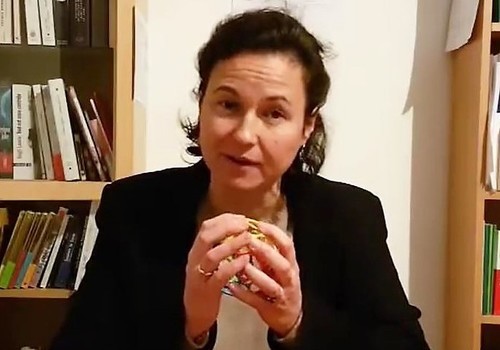
Don’t miss the interview with a mom who helped her 14-month-old son overcome screen-induced syndrome, a condition also termed “virtual autism.”: Watch it here.
Pediatricians are alarmed that babies and toddlers who spend hours a day on phones, tablets, and around TVs can develop a syndrome of marked behavioral changes that appear similar to autistic-like symptoms. The good news: the changes often disappear when the children stop all screen exposure and switch to face-to-face contact, reading, and play with parents, caregivers, other children, and non-electronic toys.
Two doctors in France are leading an awareness campaign, which they explain in this video.
“Screen viewing several hours a day prevents the brain from developing and generates behavior problems and relationship problems,” reports Dr. Anne-Lise Ducanda, speaking also for colleague Dr. Isabelle Terrasse. “We decided to make this video to warn parents, professionals, and public bodies of the grave dangers of all screens for children between the ages of zero to four.”
The doctors had noticed more and more toddlers with unusual changes in behavior. Some had stopped responding to their names and speaking words, began avoiding eye contact, and had become indifferent to the world around them. Many children lagged behind developmentally for their age and were language delayed.
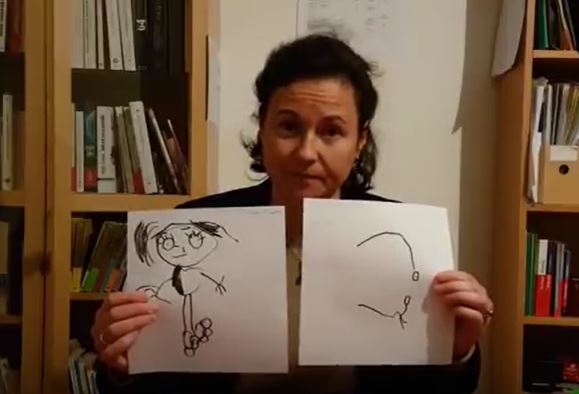
Drawing on left by a 4-year-old who spends little time on screen media. Drawing on right by a slightly older 4-year-old who was highly screen-exposed..
After asking parents in detail about the kids’ media use and household exposure, the doctors discovered almost all the children had spent large amounts of time on and around screens—in some cases, ten hours a day. But when families stopped the child’s screen exposure and greatly increased social interaction and play with the child, most if not all aspects of the condition eventually disappeared.
Various studies in Romania have come to similar conclusions, one stating “sensory-motor and socio-affective deprivation caused by the consumption of more than 4 hours/day of virtual environment can activate behaviours and elements similar to those found in children diagnosed with ASD (Autism Spectrum Disorder).”
Because this phenomenon has been so often observed in Romania, screen withdrawal there is now a therapeutic protocol for early ASD and a campaign is underway informing parents about the problem.
Romanian psychologist Marius Zamfir coined the term “Virtual Autism” to describe the screen-induced syndrome. He worries about lack of motivation among children exposed to excessive screen content. “Children’s brains are used to getting pleasure without making any effort at all,” he says in this video made for the Romanian public information campaign.
Meanwhile, a study released in 2022 of more than 84,000 Japanese babies and their mothers found that “among boys, longer screen time at 1 year of age was significantly associated with autism spectrum disorder at 3 years of age.”
“With the rapid increase in device usage,” concluded the authors, “it is necessary to review the health effects of screen time on infants and to control excessive screen time.”
Study Proves Observable Brain Changes
A study of toddlers’ brains seems to bear out the behavioral indicators.
Cincinnati Children’s Hospital researchers show evidence in JAMA Pediatrics that young children who spend more than two hours a day on screens have less brain white matter. The brain’s white matter aids in thought processing and organization, as well as performing other vital functions.
“Think of white matter as cables, sort of like telephone lines that are connecting the various parts of the brain so they can talk to each other,” study author Dr. John Hutton told CNN.
“These are tracks that we know are involved with language and literacy,” he continued. “And these were the ones relatively underdeveloped in these kids with more screen time.”
47 healthy toddlers were studied. Screen exposure among them ranged from zero to about five hours a day.
In their report, the study authors did not make a connection to virtual autism nor did they specifically mention autistic-like symptoms.
Astronomical Rise in Autism Incidence
According to the U.S. Centers for Disease Control, in 1975—when VCRs first came on scene—only one in 5,000 children in the U.S. was reported to have ASD. But by 2016, video on demand had become ubiquitous and the incidence of ASD had risen to one child in 68. The CDC now estimates the rate is 1 child in every 44.
Until very recently, “AV (audio-visual) exposure in infancy has been overlooked” as a risk factor for autism, according to research ophthalmologist Karen Frankel Heffler of Drexel University College of Medicine. As she writes in the journal Medical Hypotheses, “There has been an explosion in viewing opportunities for infants over the past 25 years, which parallels the rise in autism.”
“Attention in the vulnerable infant is drawn away from healthy social interactions toward TV, computer screens, and electronic toys,” according to Heffler.
In early 2020, JAMA Pediatrics published an analysis that Heffler co-authored which found that babies who viewed TV and videos at age one had a slightly greater chance of displaying autistic-like symptoms than non-TV watching babies by the age of two. Conversely, the study found, “Less screen exposure and more parent-child play at 12 months of age were associated with fewer ASD-like symptoms at 2 years of age.”
In 2022, Heffler’s team published a pilot intervention involving 9 children between 1 1/2 and 3 1/2 years of age who were diagnosed with ASD and watched at least 2 hours of screen media a day.
As the study shows, when screen time was replaced by increased interaction with caregivers, “Children’s screen viewing decreased from an average of 5.6 hours/day prior to intervention to 5 min/day during the study. Significant improvements were observed in core autism symptoms and parent stress from pre- to post-intervention.”
Heffler’s team also published a case study of two toddlers diagnosed with autism showed that when screen time was stopped and social time increased, there were “marked improvements in developmental trajectories.”
Australian research also shows that babies with early signs of autism may avoid an autism diagnosis if parents are taught communication skills through video feedback.
LEARN ABOUT THE LATEST TODDLERS AND SCREENS RESEARCH HERE FROM DR. KAREN HEFFLER
Researcher has Firsthand Experience with Screen-Induced Syndrome
At the first-ever Children’s Screen Time Action Network conference, I happened to meet Dr. Heffler’s research associate, Lori Frome, M.Ed. Frome is an autism treatment specialist who discovered, also by chance, that the symptoms in one of her young patients who had been diagnosed with ASD disappeared after her screen exposure was curtailed.
Frome then tried the same treatment on her own young son, who also had an ASD diagnosis. Over the course of several months with no screens but intensive face-to-face interaction with herself and other loved ones, he had “a complete developmental trajectory change in the core deficits of ASD,” as Frome describes in this video. In other words, her son became developmentally normal for his age.
Screen media has a “very addictive power,” says Dr. Ducanda. “Little by little the child can no longer do without and demands it more and more. If the parents try and withdraw him, he can go into a real meltdown.”
Doctors Ducanda and Terrasse contend that heavy doses of screen time affect what would be, in pre-digital times, the natural wiring of a child’s brain.
Watching a ball move on a screen, for instance, does not register in a child’s mind the same way it does to manipulate and throw a ball. Says Dr. Ducanda: “The small child’s brain cannot develop without this sense of touch.”
Dr. Andrew Doan, an ophthalmologist and neuroscientist, produced this video explaining the phenomenon of Virtual Autism, with great suggestions on how to limit children’s screen viewing.
In this TEDx talk, I discuss the importance of parent-child Attachment and how digital devices can interfere with early relational health.
Avoiding Screen-Induced Syndrome
So, what’s a parent to do? For one thing: respect the child’s basic developmental needs. For babies and toddlers to learn to speak, reason, and develop crucial social skills, they need face-to-face interaction with loving people and to use all their senses as often as they can.
A study from Iran proves the power of parent interaction and play. Investigators selected 12 toddlers with autistic-like symptoms who had spent half their waking hours on screen devices. Their parents were then given 8 weeks of lessons in how to play with their children, with an emphasis on eye-to-eye contact, loving touch, and continuous communication. While the parents applied these lessons at home, objects that had absorbed the children’s attention were taken away, including digital devices.
At the end of the two-month period, the children’s screen time had shrunk to a bare minimum, their ASD-like repetitive behaviors were greatly reduced, and brain studies showed ASD-like readings had returned to nearly normal.
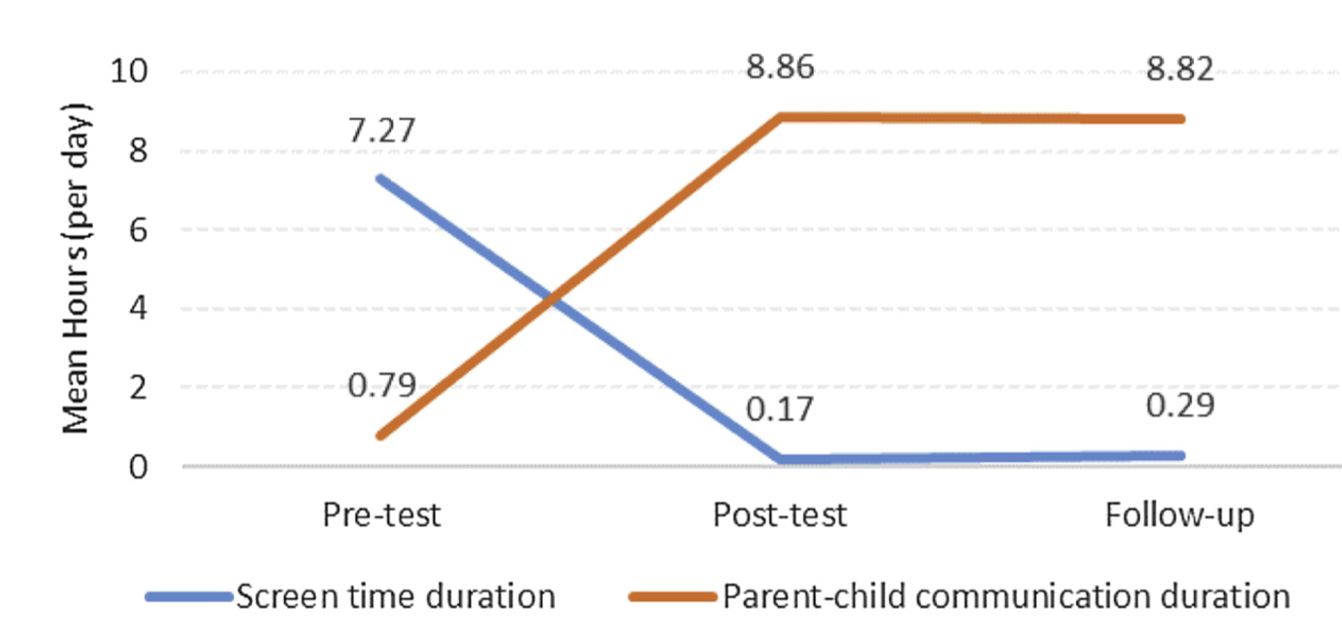
One of the study’s chief investigators told me consistency is the key. For the intervention to work, the parents had to stick with high-touch, high-talk interaction all day every day during the children’s waking hours. He says researchers can now confidently recommend that children under age three should spend their time playing and interacting face-to-face with caring adults and not using digital devices.
The American Academy of Pediatrics agrees that babies and toddlers should never use screens alone. Any interaction with screens should be limited to video calls with loved ones, with a caregiver standing by.
Preschoolers should not have more than one hour of screen time a day in order “to allow children ample time to engage in other activities important to their health and development,” says the AAP.
The World Health Organization agrees that, for the sake of their health and proper brain formation, children under age one should have no exposure to screens.
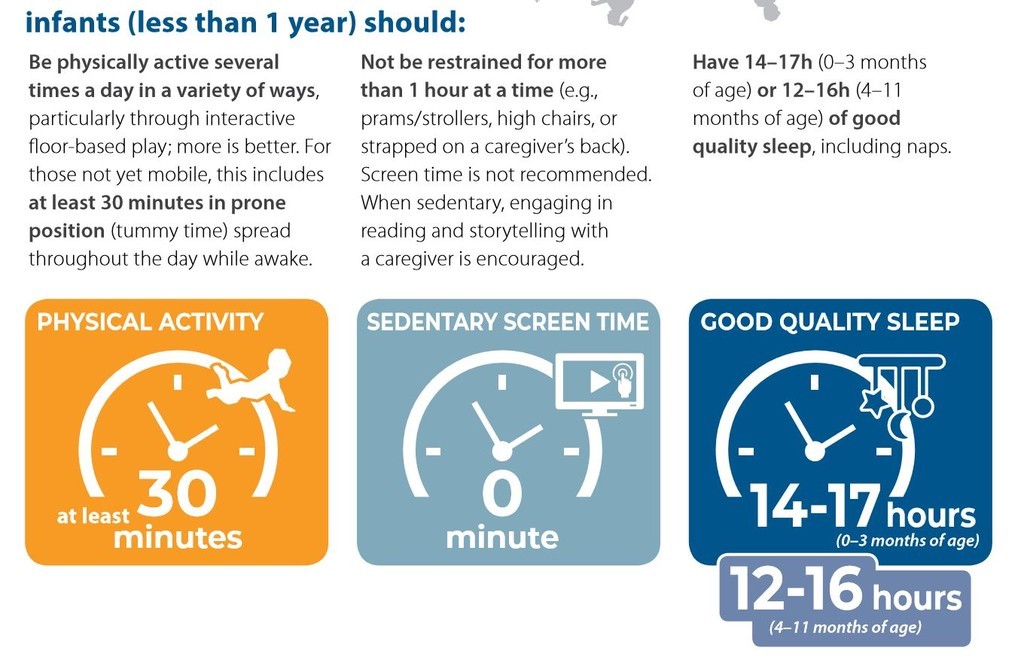
World Health Organization Infant Guidelines (Under Age One)
Early Childhood is a Once in a Lifetime Opportunity
When you look through Today’s lens, early childhood has become a rarified, once-in-a-lifetime pre-digital opportunity. As I write in The Durable Human Manifesto: Practical Wisdom for Living and Parenting in the Digital Age, each child begins life as a “wild human”—as free and unplugged as any other animal.
“When toddlers range around, freely using all of their senses to examine, taste and play with whatever they choose, they are making rich and lifelong neural connections.”
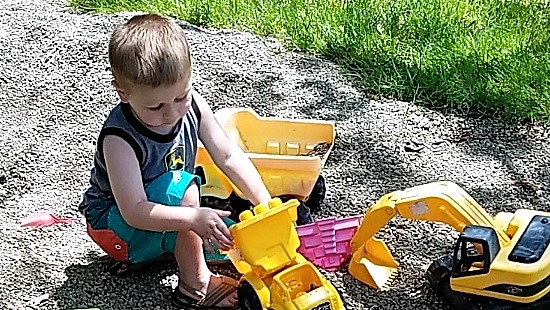
So kids can stay on a healthy developmental track, experts including Dr. Ducanda and Lori Frome recommend that you:
- Talk, play, and read with your child every day as much as possible
- Provide materials, toys, and games that require manipulation, such as empty plastic food containers and lids, stacking cups, play dough, finger paints, and a play kitchen
- Go outside at least once a day and make sure the child has time to play alone and with other children
- Not use screens when you are with your young child
- Not hand a phone to your baby or young child (and keep the screen locked, just in case they grab it)
- Keep the TV off around kids under age four, even if it’s TV on in the background and child doesn’t seem to be paying attention to what’s on the screen
- Explain to family members and caregivers why these measures are essential to a child’s healthy development, durability, and well-being
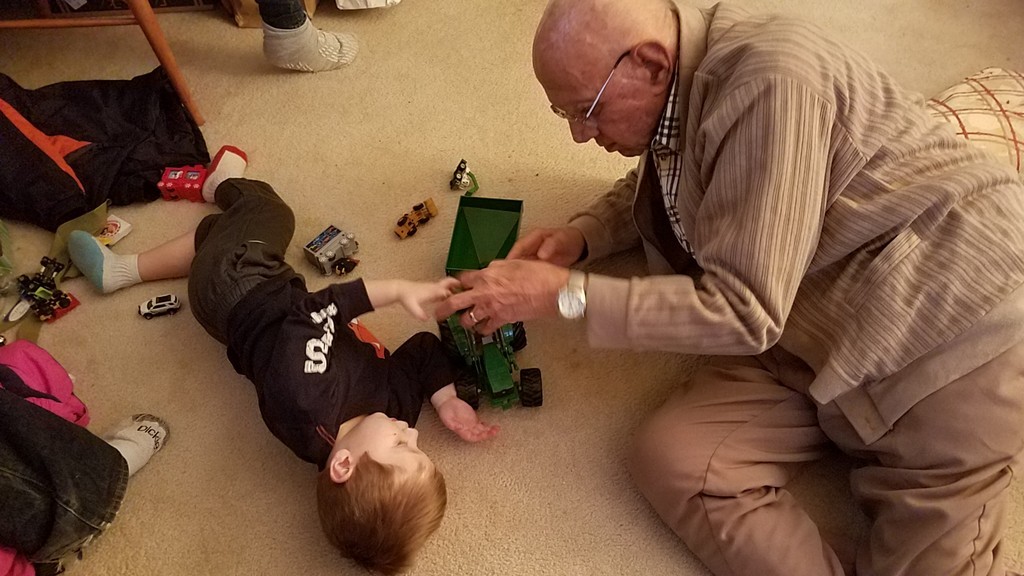
Dr. Heffler points out in her research that characteristics that may resemble those associated with autism in very young children can have a variety of causes. If symptoms do arise, Dr. Ducanda and her colleagues recommend keeping the child away from all screens for at least a month, which will require the cooperation of every household member. If that can be accomplished, she claims, ASD-like problems in many children may “miraculously disappear or diminish considerably.”
Conversely, if a child has a full, well-balanced life with very minimal screen exposure, these types of symptoms may never emerge.
Parent Resources
Watch an interview of an American mother who came forward after discovering information on this post to tell the story of how her 14-month-old son developed and overcame screen-induced syndrome.
This site has links to research and researchers.
Watch webinars with Lori Frome M. Ed. who explains how to detect, treat, and avoid screen-induced syndrome:
See the latest webinar on YouTube:
Also see this earlier webinar:
Download Lori Frome’s specially-curated Parent Resource List from the box on this page.
Finally, in this simple online course, I teach parents why and how to create loving bonds with their babies and toddlers as well as to maximize their brain development and language learning.
Note: This post was last updated on December 14, 2023
About the author:
The mom of three practicing durable humans, DurableHuman.com founder Jenifer Joy Madden is a certified digital wellness instructor, health journalist, digital media adjunct professor, and author of How To Be a Durable Human: Revive and Thrive in the Digital Age Through the Power of Self-Design and The Durable Human Manifesto.
Her work has informed millions on ABC News and Discovery Health Channel, in The Washington Post, Readers Digest and other news outlets.



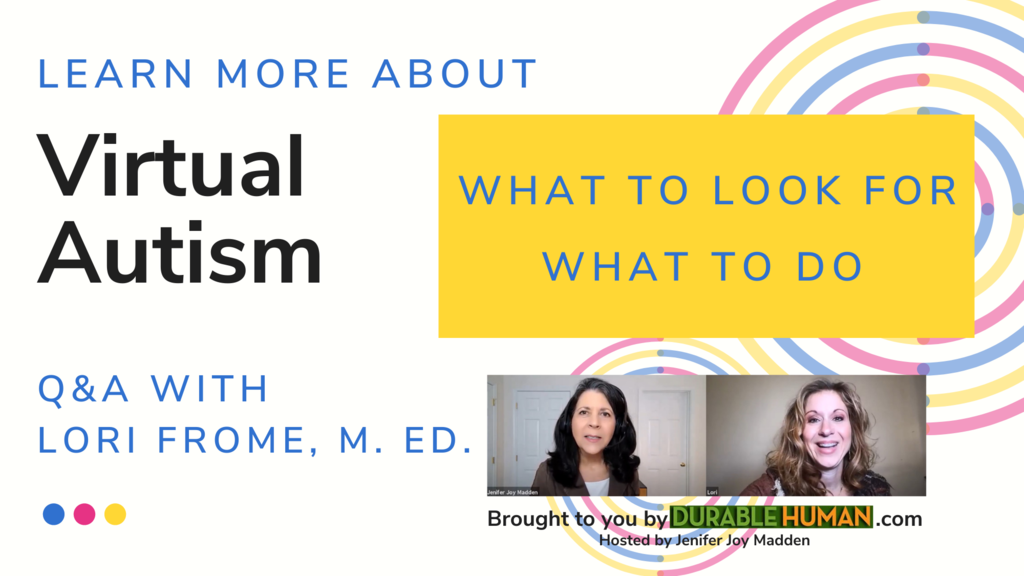
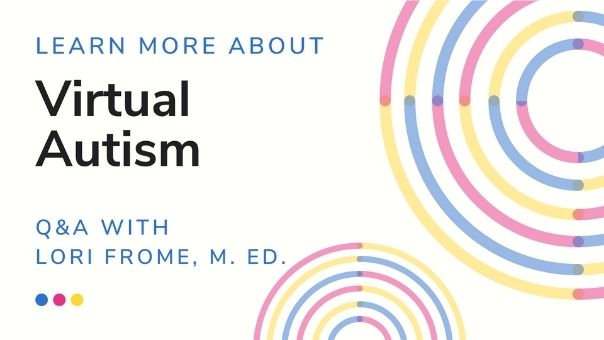

We are 8 weeks no screens. Almost 9. Showing some improvements like hugging me, kissing me, smiling at her dad again, noticing our dog who she never realized was there before. We started her in a great daycare that’s screen free, she gets OT and speech therapy weekly. We are trying so hard to do everything for our daughter because we believe it’s VA for her, but it’s early to tell. The anxiety is high and this is so stressful, but with the small improvements we see we are hopeful.
Hello everyone and glory be to God that spoke to me and saved my son!
I want to share my story with you all in the hope that it serves as a light at the end of the tunnel for anyone in need of encouragement. My son is now 26 months old, and until he was 18 months old, he was heavily exposed to cartoons. Since he was 3-4 months old, we thought he was one of the best kids you could ever have. From birth, he slept through 80% of the night without waking up and rarely gave us any trouble, except for brief growth spurts that lasted no more than 1-2 weeks. During the daytime, he watched cartoons for 4-5 hours a day sometimes, and even when he wasn’t watching, the TV was often running in the background with shows like Cocomelon and Super Simple Songs almost all day long.
Initially, he seemed to be developing somewhat normally for his age. However, around 12-13 months, I started to have concerns because he wasn’t communicating with me or others. He only played alone or with his mother and would only pay attention to others if they initiated play. This was a significant concern for me. Additionally, he only responded to his mother’s voice if she shouted and had no reaction to other voices until he was 16 months old.
My fears grew when I saw that he wasn’t talking at all. He didn’t have any meaningful words or even babbling with intent. He wasn’t pointing and exhibited a lot of stimming behaviors, such as tiptoe walking, tilting his head to his shoulder, looking out of the corner of his eyes, and following reflections constantly. Whenever I expressed my concerns, people would tell me that every child develops differently and that it was fine if he played alone because it meant he was independent. They always had an argument for everything I said and accused me of only seeing the negative in my child.
This situation, with my worries being dismissed, lasted until Milan was 17 months old. I started comparing him with his cousin, who was 2 months younger but lived with us since birth because my wife took care of her while her parents were at work. His cousin was doing many things, playing meaningfully with toys, and trying to communicate even if it was just babbling. This made me more convinced that something was not right with Milan.
I want to mention that we live in the UK, but we are originally from Romania. I stumbled upon some videos by Dr. Zamfir about virtual autism, which resonated with me. I also found many similar stories on this website. On September 3, after a huge argument with my wife, we decided to stop all TV and electronic toys. The very next day, my wife noticed changes and agreed that something was wrong with our baby.
The first week without TV was hell for all of us. Our previously calm and easy-going child turned into an addict going through withdrawal, screaming and crying constantly. Fortunately, we had a holiday planned in Romania at my parents’ place, which made things easier.
While in Romania, we consulted with my parents. My mom reassured us, saying that my sister started talking at 3 years old, but to my surprise, my dad took my side. We decided to see a psychologist, a family friend who had previously consulted my parents regarding my sister. The psychologist said we shouldn’t worry too much as Milan was still present in his surroundings but hadn’t been properly stimulated due to excessive TV exposure. She advised us not to consult a pediatric psychologist yet and to start a recovery protocol at home first, as some doctors might claim credit for any improvements and charge us heavily.
When we returned to the UK after two weeks, we started the recovery process. We followed many suggestions from this forum, and spent a lot of time outdoors regardless of the weather. The progress was slow in the first two months, and I went through a deep depression, blaming myself for everything. But after 3-4 months, things started to improve rapidly. Now, after 8 months, Milan is a completely different child. He points, counts to 10, recognizes some letters, and knows some of the alphabet with help. He knows where the moon is, has a large vocabulary, and can say some two-word sentences. He is very active, loves to be mischievous, and is generally like any other child his age. He still sometimes walks on his toes and tilts his head when he’s shy, but I believe these are things any neurotypical child might do.
A very important piece of advice from the psychologist in Romania was: “We are defined by the sum of ourselves, and we all have autistic, melancholic, psychotic, etc., traits to varying degrees. A neurotypical person is just balanced, but that doesn’t mean they have no issues at all.”
Currently, Milan doesn’t watch cartoons. We’ve only allowed it twice when cutting his hair, as it was the only way to keep him still. Sometimes he touches our phones, but he doesn’t care about the TV even when it’s on elsewhere because he’s too busy exploring and being active. We play music through speakers occasionally, but he spends most of his time outside, especially with the nice weather we’ve been having in the UK.
Having a child is hard and requires a lot of time and attention. It might be tough, especially if you’re young, but trust me, leaving a child in front of a TV creates a soulless statue that you cannot enjoy. It’s not difficult to engage in activities with your child; you just need to find joy in them, and it will get easier.
I hope you had the patience to read my entire story. It’s just a fraction of what I want to share, but I don’t want to bore anyone. I hope my story gives you hope, as God has spoken to me and saved my son.
P.S. Since the first week, we have given our son Möller’s cod liver oil almost every single day.
Hello, @Andrei. How wonderful for all our readers that you have shared the story of your family’s success! Thank you for giving all the details of helping your son, including the rough spots. Your point of finding the joy in the process of reconnecting with him is extremely important and echoed by other parents, including Robin in the Mother Speaks about Virtual Autism post. We are all indebted to Dr. Zamfir and all his crucial discoveries in Romania. He, too, encountered resistance to his ideas at first, but persevered, as you have. Bravo, too, to your wife for being willing to take a chance on screen removal. Your experience will help people have confidence that they, too, can get their children back. Your analogy of a child becoming a “soulless statue” after being left in front of too much TV will certainly ring true to others, and hopefully prompt them to follow your brave and loving footsteps.
Wow, this is amazing to read!!!! Congratulations!!! Do you mind sharing how did his communication flourished? How was his receptive language? When did he start saying words?
Hi Andrei! Thanks so much for sharing your story! Congratulations! Do you mind sharing more specifically when your child started talking and how that process was like?
Hi there, thanks for sharing it gives me hope. How is Milan now? Im nearing month two, so this is beyond hard and stressful but she shows small improvements. The hope parents like you give us parents who are early on or just starting is so needed. Thank you.
Hi Iv tried commenting before thanking you for this message of hope. But my comments seem to be deleted. I’m a mother who is almost 9 weeks screen fast for my now 25 month old. Like you said, it’s been depressing and scary because it’s early on. But I already see some changes like more awareness, she also hugs me and kisses me now, even notices my dog whereas she didn’t before. Theres no massive change yet like language or pointing but I have to accept this will take time. She sometimes claps (sometimes I wonder if it’s just a new stem though )and she has initiated hide and seek which seems hopeful. I’m hoping to get to the success part where you are, so thank you for the journey sharing. How is Milan now? Did you notice more stemming after removal? My daughter just recently at the 8 week mark started to spin in circles but not for long. Maybe 2-5 twirls and then she stops. I’m just wondering if your child cycled through new stemming habits and then they went away?
Hi, so it seems like my son who just turned 4 last month definitely has virtual autism. I’m going to completely cut off screen time as of tomorrow. But I’m just wondering is it too late to help my son as he is 4 now or if I cut off the IPad now the autism can be reversed? I know early intervention is key and I’m feeling like it’s too late for me. Please guide me.
Hello, Marryum. Thank you for writing in. Please know as you take the very important step of removing your son from screen exposure and electronic toys that the brain of a 4-year-old is still quite responsive to changes in his environment. As other parents will attest, their children at that age have generally responded well if the screen time is replaced with lots of intensive social time — that is, play, reading, talking, including your child in household routines, etc.. If you have not already, please read the information linked to in this post, the post on A Mother Speaks about Virtual Autism, and watch the videos on Virtual Autism on the Durable Human YouTube channel. I see you are also reaching out to join Kameron’s private group. There is also a private Whatsapp parent support group if you are interested. I hope you are encouraged by other parents’ experiences of success bringing their children back. Wishing you patience and strength on your journey!
Hello, it has been 2 months since screen removal and my daughter’s eye contact has improved (she will be 22 months) but when I play with her she doesn’t really look at me as she is more focused on the toys. For example: if we are stacking blocks (lego type) she won’t look at me at all as I’m holding the blocks for her to stack them. But when we are done stacking them we will clap and celebrate together and until then she will look at me. Same thing with other toys like sorting shapes. I got her used to clapping and celebrating when we are done stacking or sorting so she does it. What I try to do is grab a block hold it to my face and say “block” but she will just try to snatch it from me. Also, she will only try to stack the blocks ones and then she just wants to take them apart and just pile them between her legs and not want to build anymore. If try to take one and tell her “let’s build again?” She will take it away from me and if I insist she start getting really upset. But to be honest she has made progress because in the beginning she would just want to line them up or just display them in front of her and would get upset if we would try to grab them now she no longer lines them up and is finally ok to stack them at least once. She also started throwing the blocks and other toys randomly on the floor idk if this is “normal” toddler behavior, honestly sometimes I don’t even know what is “normal toddler behavior” anymore.
So I guess my question is how do you play to achieve joint attention? Because my daughter does not bring toys to me or initiate play. The only thing she does bring me are books. With books I get her to look at me more and she has finally started imitating some animal sounds (duck, horse, sheep and monkey). She doesn’t do the sounds exactly how they are pronounced but she is really trying. I try to play peek-a-boo with her although she smiles she does not try to do it back and gets over it very quickly.
When my husband plays with our son (7 years old) with dinosaurs she will walk over to them and stand or sit where they are and will just stare or she will try to take them away from them and just pile them between her legs. Whatever item or toy my son has she just wants to take it from him.
Most of the time I feel so lost and confused. I cry a lot especially when I come back from the park when I see other kids her age and I know I should not compare her but is just so hard not to. Sometimes I think she has autism other times I think she is developmentally delayed because of so much screen time and lack of interaction and wonder if she’s going to be ok?
I am on the wait list for speech therapy and occupational therapy so having that to look forward keeps me positive.
Would any mothers that have commented on here be interested in starting a group chat or chat on WhatsApp to share our experiences and have extra support as mothers going through this journey?
I’ve already made one friend through this blog post and thought the more support we have the better!
I guess just comment below if you interested!
Hi Kam,
I am interested doing group chat I have a Whatsapp please email me at Glazel.benzon@yahoo.com
Yes, I’m interested.
Type your email and I’ll create a chat on what’s app
lilypacheco75@yahoo.com
Comment your email and I’ll add you to the group!
Great you are organizing a support group for commenters, Kam! FYI – there is an existing private WhatsApp group started by a mom in France that’s been going for a while. If you or other readers would like info to join that one (too?), request in a comment and we’ll send the link to you by email.
Hi, I’m interested. superb@gmail.com
please add me fatimaakhtar0409@gmail.com
Would you plz add me to the groep
My email adres is safiyabule@gmail.com
Please add me Deborahcourage0@gmail.com
Hi please add me to the group. Maryum.yasin@hotmail.com
Thank you!!
Hello please add me to the whatsapp group. Thank you so much!